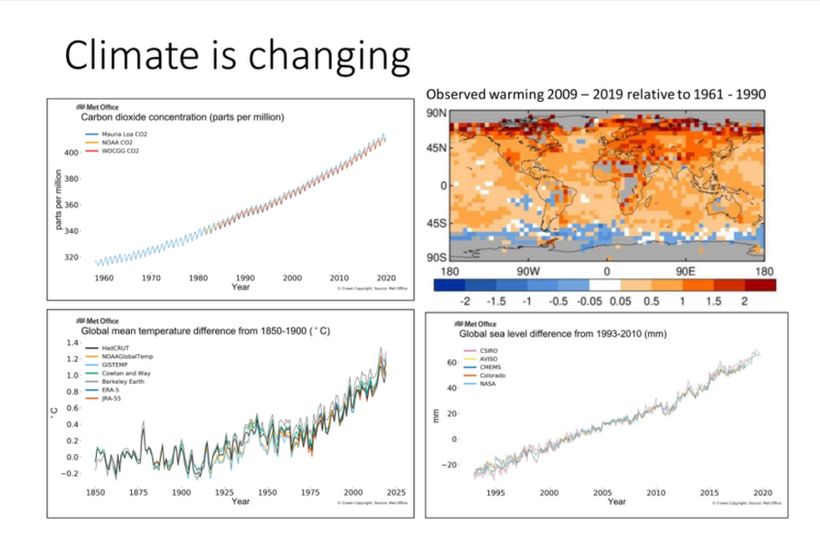

A slide show that Prime Minister Boris Johnson says helped convince him on climate change has been revealed for the first time.
The slides used to “teach” him about climate science have been released after a Freedom of Information request by UK climate website Carbon Brief.
While Mr Johnson has urged action on climate change, he previously, as a journalist, expressed scepticism.
He called the presentation, given just after he took office, “very important”.
The “teach in”, as it was described in email correspondence, took place in the Cabinet Room of Number 10 Downing Street on 28 January 2020.
It was organised by the office of Sir Patrick Vallance, the government’s chief scientific adviser.
The briefing consisted of 11 slides showing key aspects of climate science and its impacts and the presentation was led by Prof Stephen Belcher, the chief scientist at the Met Office.
The first slide shows the global temperature rise since 1850 alongside graphs showing how carbon dioxide concentrations in the atmosphere have increased and how sea level has risen.
 IMAGE SOURCE,MET OFFICE
IMAGE SOURCE,MET OFFICEOther slides show the increasing frequency of extreme weather events and a comparison of global temperatures against estimates of what they would have been without human influence.
There are tables showing the impacts of global warming, including how sea level rise will affect the UK, as well as slides showing how greenhouse gas emissions need to be cut to keep warming in check. You can see them here.
Prof Belcher described the evidence as “reasonably vanilla” in an email, but it seems to have made a big impression on the prime minister.
Mr Johnson spoke to journalists about the briefing as he flew to Rome in late October 2021 for a meeting of world leaders a week before the COP26 UN climate conference.
“I got them to run through it all and, if you look at the almost vertical kink upward in the temperature graph, the anthropogenic climate change, it’s very hard to dispute. That was a very important moment for me,” Mr Johnson told reporters on the prime ministerial plane.
He has also described it as his “road to Damascus” on climate – a phrase from the bible meaning a turning point in someone’s life.
Some climate experts have told the BBC they are surprised the prime minister was not already familiar with much of the material in the briefing.
A version of the temperature graph that made such an impression on Mr Johnson plays a key role in Al Gore’s 2006 film and book, An Inconvenient Truth, for example.
“It is shocking he only had his Damascene moment in 2020 given how much effort scientists have made to communicate the risks of climate change over the years,” said Emily Shuckburgh, head of Cambridge Net Zero, the university’s climate change initiative.
Leo Hickman, the editor of Carbon Brief, was also surprised how long it took for Mr Johnson to have his “personal epiphany on climate change.”
In his previous career as a journalist and columnist Mr Johnson called into question the evidence that human emissions were the main force driving global warming.
In a 2013 article he suggested that year’s cold winter should prompt the government “to start taking seriously the possibility – however remote – that [Piers] Corbyn is right.”
Piers Corbyn is the brother of former Labour leader Jeremy Corbyn and an outspoken climate sceptic who says the behaviour of the sun, not CO2 concentrations, is the key driver of global temperature.
However, there is agreement among scientists that it is a good thing that Mr Johnson has recognised the urgency of tackling the problem and has made it a priority for his administration. – bbc.com